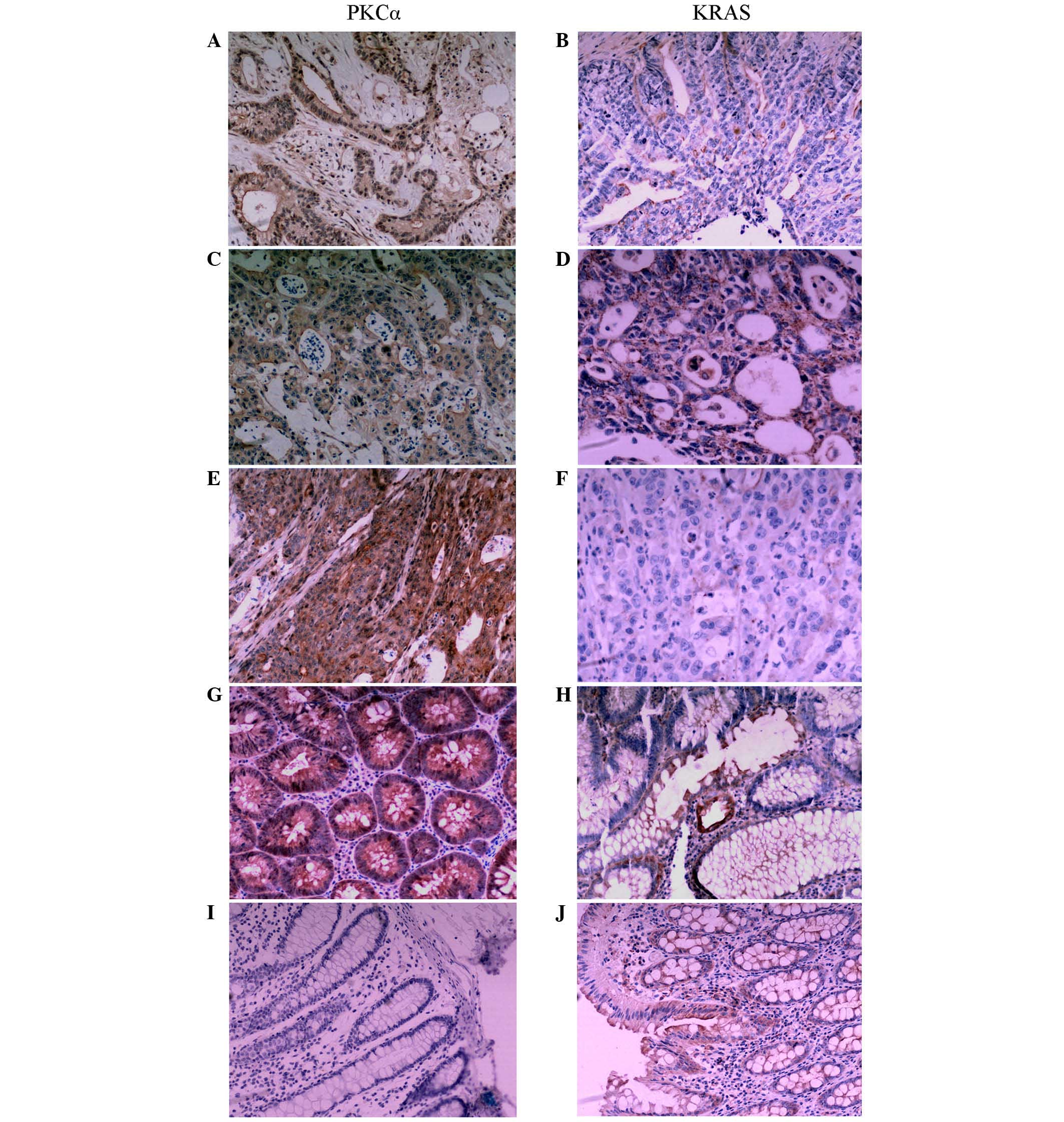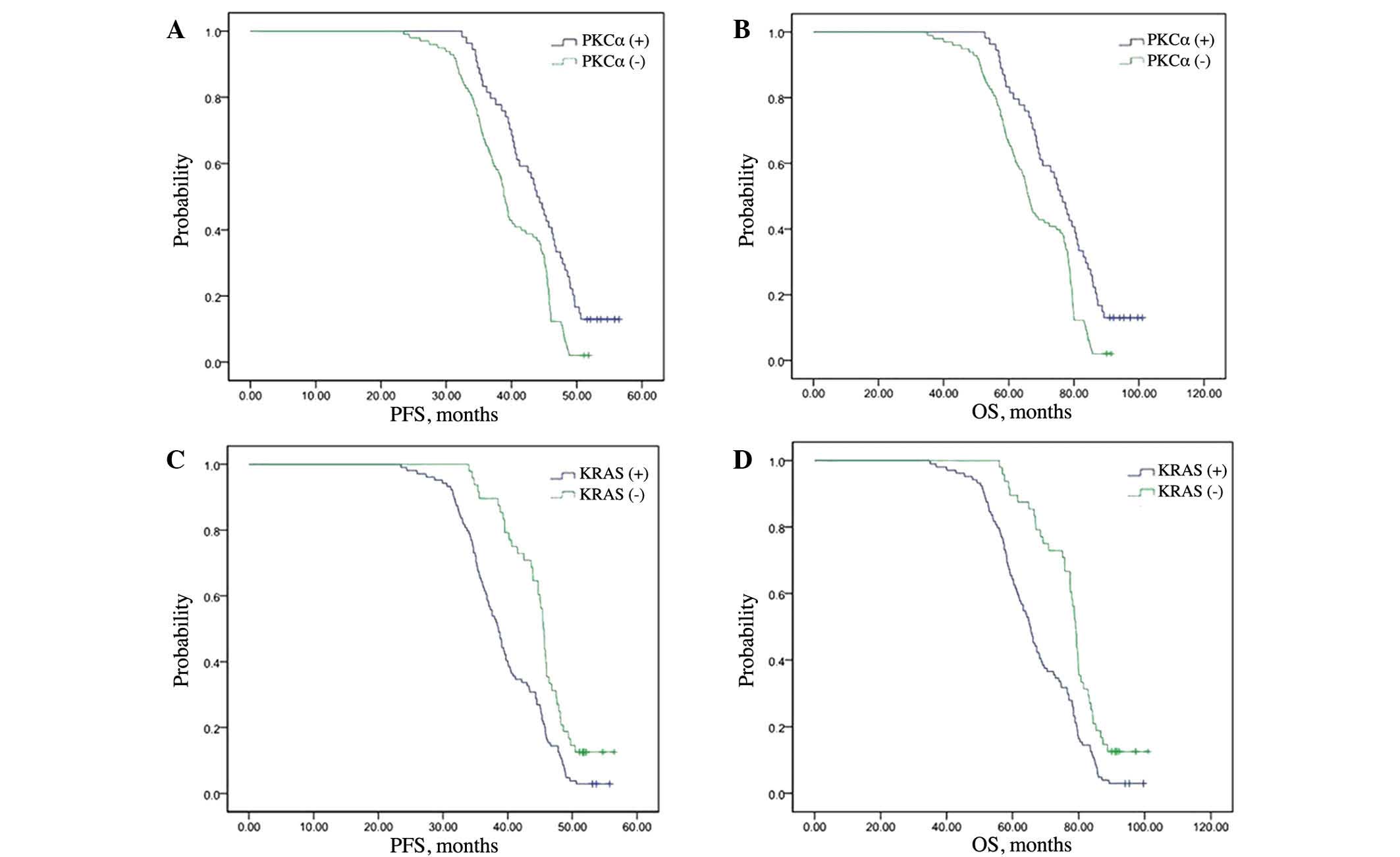|
1
|
Siegel R, Naishadham D and Jemal A: Cancer
statistics. 2012. CA Cancer J Clin. 62:10–29. 2012. View Article : Google Scholar : PubMed/NCBI
|
|
2
|
Fang YJ, Wu XJ, Zhao Q, Li LR, Lu ZH, Ding
PR, Zhang RX, Kong LH, Wang FL, Lin JZ, et al: Hospital-based
colorectal cancer survival trend of different tumor locations from
1960 s to 2000s. PLoS One. 8:e735282013. View Article : Google Scholar : PubMed/NCBI
|
|
3
|
Wong RK, Tandan V, De Silva S and
Figueredo A: Pre-operative radiotherapy and curative surgery for
the management of localized rectal carcinoma. Cochrane Database
Syst Rev: CD002102. 2007. View Article : Google Scholar
|
|
4
|
André T, Boni C, Navarro M, Tabernero J,
Hickish T, Topham C, Bonetti A, Clingan P, Bridgewater J, Rivera F
and de Gramont A: Improved overall survival with oxaliplatin,
fluorouracil, and leucovorin as adjuvant treatment in stage II or
III colon cancer in the MOSAIC trial. J Clin Oncol. 27:3109–3116.
2009. View Article : Google Scholar : PubMed/NCBI
|
|
5
|
de Gramont A, Figer A, Seymour M, Homerin
M, Hmissi A, Cassidy J, Boni C, Cortes-Funes H, Cervantes A, Freyer
G, et al: Leucovorin and fluorouracil with or without oxaliplatin
as first-line treatment in advanced colorectal cancer. J Clin
Oncol. 18:2938–2947. 2000.PubMed/NCBI
|
|
6
|
Kline CL, Sheikh HS, Scicchitano A,
Gingrich R, Beachler C, Finnberg NK, Liao J, Sivik J and El-Deiry
WS: Preliminary observations indicate variable patterns of plasma
5-fluorouracil (5-FU) levels during dose optimization of infusional
5-FU in colorectal cancer patients. Cancer Biol Ther. 12:557–568.
2011. View Article : Google Scholar : PubMed/NCBI
|
|
7
|
Micol V, Sánchez-Piñera P, Villalain J, de
Godos A and Gómez-Fernández JC: Correlation between protein kinase
C alpha activity and membrane phase behavior. Biophys J.
76:916–927. 1999. View Article : Google Scholar : PubMed/NCBI
|
|
8
|
Frazer GS: Uterine torsion followed by
jejunal incarceration in a partially everted urinary bladder of a
cow. Aust Vet J. 65:24–25. 1988. View Article : Google Scholar : PubMed/NCBI
|
|
9
|
Haughian JM and Bradford AP: Protein
kinase C alpha (PKCalpha) regulates growth and invasion of
endometrial cancer cells. J Cell Physiol. 220:112–118. 2009.
View Article : Google Scholar : PubMed/NCBI
|
|
10
|
Nakashima S: Protein kinase C alpha (PKC
alpha): Regulation and biological function. J Biochem. 132:669–675.
2002. View Article : Google Scholar : PubMed/NCBI
|
|
11
|
Masur K, Lang K, Niggemann B, Zanker KS
and Entschladen F: High PKC alpha and low E-cadherin expression
contribute to high migratory activity of colon carcinoma cells. Mol
Biol Cell. 12:1973–1982. 2001. View Article : Google Scholar : PubMed/NCBI
|
|
12
|
Fournier DB, Chisamore M, Lurain JR,
Rademaker AW, Jordan VC and Tonetti DA: Protein kinase C alpha
expression is inversely related to ER status in endometrial
carcinoma: Possible role in AP-1-mediated proliferation of
ER-negative endometrial cancer. Gynecol Oncol. 81:366–372. 2001.
View Article : Google Scholar : PubMed/NCBI
|
|
13
|
Koren R, Ben Meir D, Langzam L, Dekel Y,
Konichezky M, Baniel J, Livne PM, Gal R and Sampson SR: Expression
of protein kinase C isoenzymes in benign hyperplasia and carcinoma
of prostate. Oncol Rep. 11:321–326. 2004.PubMed/NCBI
|
|
14
|
Neill GW, Ghali LR, Green JL, Ikram MS,
Philpott MP and Quinn AG: Loss of protein kinase Calpha expression
may enhance the tumorigenic potential of Gli1 in basal cell
carcinoma. Cancer Res. 63:4692–4697. 2003.PubMed/NCBI
|
|
15
|
Oster H and Leitges M: Protein kinase C
alpha but not PKCzeta suppresses intestinal tumor formation in
ApcMin/+ mice. Cancer Res. 66:6955–6963. 2006. View Article : Google Scholar : PubMed/NCBI
|
|
16
|
Lee SK, Shehzad A, Jung JC, Sonn JK, Lee
JT, Park JW and Lee YS: Protein kinase Cα protects against
multidrug resistance in human colon cancer cells. Mol Cells.
34:61–69. 2012. View Article : Google Scholar : PubMed/NCBI
|
|
17
|
Kranenburg O: The KRAS oncogene: Past,
present, and future. Biochim Biophys Acta. 1756:81–82.
2005.PubMed/NCBI
|
|
18
|
McGrath JP, Capon DJ, Smith DH, Chen EY,
Seeburg PH, Goeddel DV and Levinson AD: Structure and organization
of the human Ki-ras proto-oncogene and a related processed
pseudogene. Nature. 304:501–506. 1983. View
Article : Google Scholar : PubMed/NCBI
|
|
19
|
Vogelstein B and Kinzler KW: Cancer genes
and the pathways they control. Nat Med. 10:789–799. 2004.
View Article : Google Scholar : PubMed/NCBI
|
|
20
|
Lièvre A, Bachet JB, Le Corre D, Boige V,
Landi B, Emile JF, Côté JF, Tomasic G, Penna C, Ducreux M, et al:
KRAS mutation status is predictive of response to cetuximab therapy
in colorectal cancer. Cancer Res. 66:3992–3995. 2006. View Article : Google Scholar : PubMed/NCBI
|
|
21
|
Hill KS, Erdogan E, Khoor A, Walsh MP,
Leitges M, Murray NR and Fields AP: Protein kinase Cα suppresses
Kras-mediated lung tumor formation through activation of a p38
MAPK-TGFβ signaling axis. Oncogene. 33:2134–2144. 2014. View Article : Google Scholar : PubMed/NCBI
|
|
22
|
Wen-Sheng W: Protein kinase C alpha
trigger Ras and Raf-independent MEK/ERK activation for TPA-induced
growth inhibition of human hepatoma cell HepG2. Cancer Lett.
239:27–35. 2006. View Article : Google Scholar : PubMed/NCBI
|
|
23
|
Nitzsche L: Results of radical operation
of rectal carcinoma in relation to the tumor size (Dukes' stages A
to D). Zentralbl Chir. 94:994–997. 1969.(In German). PubMed/NCBI
|
|
24
|
Mor V, Laliberte L, Morris JN and Wiemann
M: The Karnofsky Performance Status Scale. An examination of its
reliability and validity in a research setting. Cancer.
53:2002–2007. 1984. View Article : Google Scholar : PubMed/NCBI
|
|
25
|
Eisenhauer EA, Therasse P, Bogaerts J,
Schwartz LH, Sargent D, Ford R, Dancey J, Arbuck S, Gwyther S,
Mooney M, et al: New response evaluation criteria in solid tumours:
revised RECIST guideline (version 1.1). Eur J Cancer. 45:228–247.
2009. View Article : Google Scholar : PubMed/NCBI
|
|
26
|
Randall JK and Gilbert JM: Innovations and
developments in surgical coloproctology. J R Soc Med. 106:178–183.
2013. View Article : Google Scholar : PubMed/NCBI
|
|
27
|
Lin YL and Liang JT: FOLFOX4 in the
adjuvant treatment of colon cancer in Asian patients.
Hepatogastroenterology. 59:400–404. 2012.PubMed/NCBI
|
|
28
|
André T, Iveson T, Labianca R, Meyerhardt
JA, Souglakos I, Yoshino T, Paul J, Sobrero A, Taieb J, Shields AF,
et al: The IDEA (International Duration Evaluation of Adjuvant
Chemotherapy) Collaboration: Prospective Combined Analysis of Phase
III Trials Investigating Duration of Adjuvant Therapy with the
FOLFOX (FOLFOX4 or Modified FOLFOX6) or XELOX (3 versus 6 months)
Regimen for Patients with Stage III Colon Cancer: Trial Design and
Current Status. Curr Colorectal Cancer Rep. 9:261–269. 2013.
View Article : Google Scholar : PubMed/NCBI
|
|
29
|
Basu A: The potential of protein kinase C
as a target for anticancer treatment. Pharmacol Ther. 59:257–280.
1993. View Article : Google Scholar : PubMed/NCBI
|
|
30
|
Kuranami M, Powell CT, Hug H, Zeng Z,
Cohen AM and Guillem JG: Differential expression of protein kinase
C isoforms in human colorectal cancers. J Surg Res. 58:233–239.
1995. View Article : Google Scholar : PubMed/NCBI
|
|
31
|
Suga K, Sugimoto I, Ito H and Hashimoto E:
Down-regulation of protein kinase C-alpha detected in human
colorectal cancer. Biochem Mol Biol Int. 44:523–528.
1998.PubMed/NCBI
|
|
32
|
Gwak J, Jung SJ, Kang DI, Kim EY, Kim DE,
Chung YH, Shin JG and Oh S: Stimulation of protein kinase C-alpha
suppresses colon cancer cell proliferation by down-regulation of
beta-catenin. J Cell Mol Med. 13:2171–2180. 2009. View Article : Google Scholar : PubMed/NCBI
|
|
33
|
Shimizu K, Goldfarb M, Perucho M and
Wigler M: Isolation and preliminary characterization of the
transforming gene of a human neuroblastoma cell line. Proc Natl
Acad Sci USA. 80:383–387. 1983. View Article : Google Scholar : PubMed/NCBI
|
|
34
|
Bos JL: Ras oncogenes in human cancer: A
review. Cancer Res. 49:4682–4689. 1989.PubMed/NCBI
|
|
35
|
Karapetis CS, Khambata-Ford S, Jonker DJ,
O'Callaghan CJ, Tu D, Tebbutt NC, Simes RJ, Chalchal H, Shapiro JD,
Robitaille S, et al: K-ras mutations and benefit from cetuximab in
advanced colorectal cancer. N Engl J Med. 359:1757–1765. 2008.
View Article : Google Scholar : PubMed/NCBI
|
|
36
|
Amado RG, Wolf M, Peeters M, Van Cutsem E,
Siena S, Freeman DJ, Juan T, Sikorski R, Suggs S, Radinsky R, et
al: Wild-type KRAS is required for panitumumab efficacy in patients
with metastatic colorectal cancer. J Clin Oncol. 26:1626–1634.
2008. View Article : Google Scholar : PubMed/NCBI
|
|
37
|
Dempke WC and Heinemann V: Ras mutational
status is a biomarker for resistance to EGFR inhibitors in
colorectal carcinoma. Anticancer Res. 30:4673–4677. 2010.PubMed/NCBI
|
















